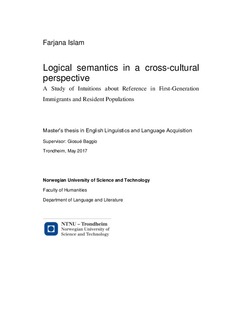| dc.description.abstract | Theories of reference in analytic philosophy are often constructed and tested by consulting one’s own intuitions about the reference of terms in hypothetical situations. The reference of proper names has been a key area of disagreement among philosophers. Theories of reference are supposed to explain how names pick out their referents. Recent studies (e.g., Nisbett et al., 2001; Weinberg et al., 2001), however, have demonstrated a systematic variation in intuitions between Asians and Westerners, extending to reference (Machery et al., 2004). Taking this idea as a point of departure, this study is an attempt to replicate the findings of Machery et al., (2004), together with three others research objectives: (1) replicate their findings of the Gödel cases (Gödel and Jonah cases are originally used by Kripke, 1980); (2) test for differences in intuitions among participants from three distinct cultural groups (i.e. Norwegians residents, Bangladeshi residents, and Asian Immigrants in Norway), based on their geographical/cultural backgrounds and Immigration status; (3) resolve a significant difference in the current analysis concerning Jonah cases, which hold a different view of what should count as a response consistent the Causal point of view, compared to the previous study, and (4) test for differences in intuitions based on the Kripke’s distinction of semantic reference and speaker’s reference. Considering those objectives, an experiment was carried out in three groups of 25 participants (N=75 in total), and our findings provide a partial replication of Machery et al., (2004). We found a geographical/cultural variation in intuitions among participants with no statistical effect of immigration status. Specifically, the group of Norwegians appears split into two sub-groups, with approximately half of them showing a preference for the Causal-historical view of reference. For the two other groups of participants, namely, Bangladeshi residents, and Asian immigrants, the data, however, suggest different conclusions from Machery et al., (2004). By joining both cases together as a solution of the difference in Jonah cases, findings exhibit Asian participants including Immigrants, and rest of the Norwegians produced responses consistent with speaker's reference, instead of the Descriptive view. We, therefore, conclude that only part of Norwegians participants had referential intuitions, in accord with a broadly externalist account of semantic reference. In contrast, our Asian participants derive their intuitions in accord with speaker’s reference. | nb_NO |
